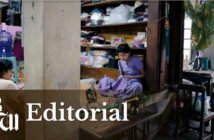Unlike your doctor’s office at home, the chances of running into someone you know at Lehigh’s Health & Wellness Center are pretty high. Most students probably expect this. What catches more students off guard, however, is that their peers are also working at the health center.
Who wants to have a peer overhear a request for STI testing, accidentally catch a glimpse of a foot fungus diagnosis or watch as you self-consciously pay for a dosage of emergency contraception? It is already hard enough to ask for advice on some of these sensitive issues, but does the fear of peer involvement prevent students from seeking the medical attention they need?
It shouldn’t, but the center’s casual atmosphere and the presence of work-study students can breed misconceptions about its level of professionalism.
The Health & Wellness Center functions like a regular doctor’s office, and all staff members and student workers are subject to the same privacy laws. Each year, they are trained on the principles of HIPAA (the Health Insurance Portability and Accountability Act— a U.S. law that protects patients’ medical privacy) and must sign a form acknowledging their obligation to act in accordance with that law, according to Christina Finley, the center’s administrative and HIPAA coordinator.
The center’s privacy policy, furthermore, says, “Student employees who would violate this policy would be terminated immediately, and other university disciplinary actions may be imposed.”
While it is reassuring to know that there would be severe consequences for a confidentiality breach, students still might wonder whether that actually prevents student workers from sharing the information they acquire during their shifts. Even if work-study students fully follow HIPAA, some patients may still feel uncomfortable simply with the work-study students’ possible knowledge of their medical information.
But to calm some of those worries, Finley says the work-study students can only access a limited amount of information.
“Work-study students do not read the forms that patients complete for the triage nurse, and they are not permitted to open medical charts,” she said. She also firmly stated that, although they do handle files, they are never allowed to open the files, and a staff member always supervises them.
One of the roles of work-study students in the Health Center, she said, is to direct patients when they arrive. However, with some of their new technology, this role will require less patient-student interaction. For example, the nurse triage line, newly available this semester, allows students to call and speak with a nurse, “who will give advice or schedule an appointment with the appropriate provider.” Students can also call the main desk or use the student health portal to schedule appointments online.
“The goal of the changes is to give students easier access to making appointments, so that students will have shorter times in the waiting room,” she said. However, it could also mean that students feel more comfortable using the Health & Wellness Center when they have issues that are more personal.
The bottom line is this: Students should never think twice about asking for medical consultation. All Health & Wellness Center staff members and work-study students need to uphold their responsibility to protecting patients’ privacy so our student body can be as healthy and worry-free as possible.
If you have Health & Wellness Center privacy concerns or complaints, you can speak with HIPAA Coordinator Christina Finley, HIPAA Officer Dr. Susan Kitei, or email [email protected]. You can also speak to HIPAA Compliance Officer Frank Roth in the office of the General Counsel.






Comment policy
Comments posted to The Brown and White website are reviewed by a moderator before being approved. Incendiary speech or harassing language, including comments targeted at individuals, may be deemed unacceptable and not published. Spam and other soliciting will also be declined.
The Brown and White also reserves the right to not publish entirely anonymous comments.